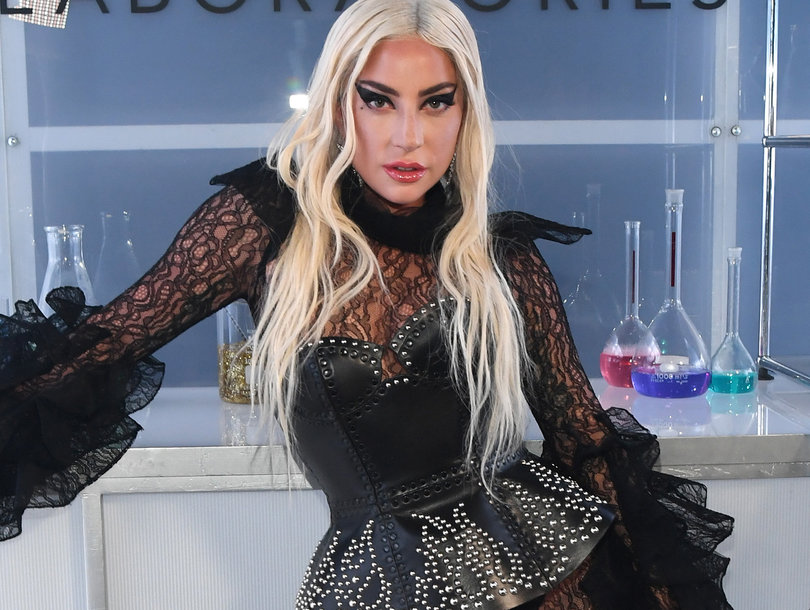Behind her out-of-the-box style, killer vocals, superb writing and acting skills, and countless awards is a version of Lady Gaga only her mother knows.
Cynthia Germanotta sat down with Shenielle Jones for this week’s episode of the “Today” show’s digital series, “Through Mom’s Eyes,” where she got real about what it was like raising a now-global superstar. Born Stefani Germanotta, Cynthia says her daughter’s uniqueness wasn’t always celebrated, and it actually contributed to bullying and depression at a young age.
Germanotta said she and her husband gave their girls (they’re also parents to Gaga’s sister, Natali) the freedom to be themselves because “the more you do that and the earlier that you do that, you’re empowering them to build a sense of confidence and to build a sense that they can accomplish anything because you’re letting them explore.”
But as we all know, kids can be cruel and don’t always embrace individuality. By the same token, kids don’t always tell their parents what’s really going on.
“I knew some of it, but there’s some of it that she didn’t share because she was either embarrassed or afraid to tell me, and that was a little hard to hear,” Cynthia recalled of Stefani getting picked on. “And then in middle school, because she was unique, she started experiencing a lot of struggles. You know, feeling isolated from events, humiliated, taunted. And that’s when she developed depression.”
“We tried our best as parents to help her,” she added, “but [we] didn’t know everything.”
Germanotta made sure to note attention to mental health was not the same back then as it is today, saying, “I felt where I made mistakes was I didn’t really know the warning signs to look for.”
That’s why in 2012, Cynthia and Stefani launched the Born This Way Foundation as a way to empower young people and help those experiencing mental and emotional distress.
“It’s something that’s very, very personal to us, and it goes back to the struggles that Stefani had growing up,” Cynthia told Shenielle of the organization. “She envisioned a world where young people were better equipped to deal with her struggles than she was.”
“And then as her career took off, we realized how many other young people had similar experiences, and her message was really resonating with them cause she would talk about her experiences during her performance, which, as a mom, I didn’t quite understand,” the mother of two recalled. “I would say, ‘Why are you being so private in public? These are very personal things.’ I mean, when I grew up, you didn’t talk…you didn’t share that.”
“But she shared it,” Germanotta went on, “and what I came to realize is it was very healing for her and also her fans.”
Lady Gaga first opened up to the media about her mental health in December 2016, revealing her battle with post-traumatic stress disorder during a visit with a group of homeless LGBTQ teens in New York.
“I told the kids today, ‘I suffer from PTSD.’ I’ve never told anyone that before, so here we are,” she said at the time. “But the kindness that’s shown to me by doctors as well as my family and my friends, it’s really saved my life.”
It wasn’t until 2018 that Gaga revealed the cause of her PTSD: she was sexually assaulted when she was 19.
“No one else knew. It was almost like I tried to erase it from my brain. And when it finally came out, it was like a big, ugly monster. And you have to face the monster to heal,” she told Vogue. “For me, with my mental health issues, half of the battle in the beginning was, I felt like I was lying to the world because I was feeling so much pain but nobody knew. So that’s why I came out and said that I have PTSD, because I don’t want to hide — any more than I already have to.”
Then during an acceptance speech for “A Star Is Born,” the musician spoke openly about what led her to seek professional help. According to Gaga, her mental health became compromised the more famous she got.
“There were also symptoms, symptoms of dissociation and PTSD, and I did not have a team that included mental health support,” she said at the time. “This later morphed into physical chronic pain, fibromyalgia, panic attacks, acute trauma responses and debilitating mental spirals that have included the suicidal ideation and masochistic behavior. Okay, I’m done with my list, but that list changed my life. And it changed my life not in a good way.”
“I wish I had mental health resources then because, although what I have is treatable and can hopefully and will get better over time, if there was preventative mental health care accessible to me earlier, I believe it might not have gotten as bad as it did,” she noted. “I wish there had been a system in place to protect and guide me. A system in place to empower me to say no to things I felt I had to do. A system in place to empower me to stay away from toxic working environments or working with people that were of seriously questionable character.”
“There were days I struggled or couldn’t make it to work,” she said, “and I don’t want that for other artists. Or for anyone.”
If you or someone you know is harming themselves or has suicidal thoughts, please contact the National Suicide Prevention Lifeline at 1-800-273-8255, text “STRENGTH” to the Crisis Text Line at 741-741 or go to SuicidePreventionLifeline.org.
Got a story or a tip for us? Email TooFab editors at [email protected].
View Photo
Getty
Lady Gaga Celebrates Haus Laboratories Launch

